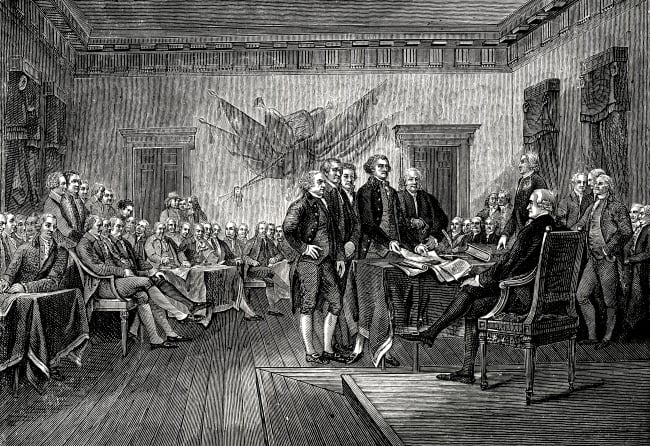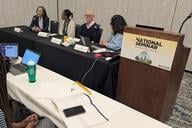You have /5 articles left.
Sign up for a free account or log in.

Getty Images
Who’s better suited to teach about American institutions and ideals: cultural anthropologists or historians of U.S. history? That question is at the heart of a debate about a general education requirement at Sacramento State University that’s riled historians there.
“This has just been a travesty,” said Joseph A. Palermo, a professor of history who opposes the university’s recent decision to allow an anthropology course on cultural diversity in the U.S. to fulfill a state requirement that students complete "comprehensive study" in American history, institutions and ideals, including those relating to the Constitution. The longstanding mandate for all California State University System students has been most commonly fulfilled by two courses in U.S. history and government, and at Sacramento State a survey history course covering 1877 to the present is especially popular. Of the new anthropology alternative, Palermo continued, “This is not a history course -- it’s deficient on all levels.”
Aaron Cohen, the history chair, agreed that the course failed to satisfy the state requirement and objected to what he described as the university skirting state code. “The law says we have to do it. …It’s been interpreted for 40 or 50 years in a very commonsensical way that students take U.S. history classes, and that’s not too difficult to understand.” Moreover, he said, the university enrolls many students who are immigrants and may not otherwise learn the fundamentals of American history and civic engagement.
Some in the anthropology department, meanwhile, say that the American institution and ideals requirement is broader than just history or government. Raghuraman Trichur, professor and chair, said the Anthropology 101 general education option had been vetted by two separate curriculum committees for its fitness to fulfill the mandate. (Note: A previous version of this sentence erroneously reversed Trichur's first and last names.) Instead of a chronological approach to American institutions and ideals, the new course -- which is an updated version of an existing course -- will take a more thematic route, with an eye toward diversity.
“Historians have a way of engaging with history, and similarly we have a way of engaging with history,” Trichur said. “We are supposed to do the major events within 100 years and within this course in particular we’ll talk about civil rights, unionization in the U.S. We’ll talk about women’s enrollment in the workforce and the emergence of the black Muslim community and the interactions between diverse populations that made that happen.”
He continued, “We go beyond the standard for American history in discussing how people make history in other domains. As far as I’m concerned, Malcolm X is as important in the discussion as any other individual. …Gender is an institution, race is an institution. There is a history to all institutions that needs to be exposed.”
But not everyone in the department agrees the change is a good idea. Terri Castaneda, another professor of anthropology, said via email that she thought the current Anthropology 101 course had a lot to offer students. She said she didn't think it could satisfy all the learning objectives that will be required in its new iteration, though.
“The course (without the burden of the American institutions requirements) has been an incredibly valuable venue for us to help students (especially those outside our major) think critically about how all nation-states narrate their histories (privileging some peoples, events and values over others), strive to cultivate a sense of imagined community and cultural belonging, and attempt (with varying degrees of success) to domesticate the resistance of those who are economically and politically marginalized,” Castaneda said.
However, she added, "I am not qualified to teach a condensed version of American (or even California Indian) history. Furthermore, trying to add such content onto a [one-semester course] that also continues to teach the critical anthropological theory and perspectives for which it has a proven track record seems unimaginable to me[.]"
It’s unclear how much the course will change by the fall, if at all, but a current catalog description reads as follows: “Focuses on analyzing the historically conditioned political, economic and social factors that have contributed to cultural diversity in the U.S.; a critical anthropological approach is developed to explore the intersection of race, class, gender, ethnicity and sexuality; the political economy of institutions and ideas, such as racism, classism, sexual stereotyping, family, religion, state, color blindness, multiculturalism, etc.; and, discourses of cultural diversity in the U.S.”
Palermo, who teaches the U.S. history survey course that currently fulfills the requirement, said some of the debate between the anthropologists pushing the new course and the history department was ideological. But it’s not simply left-right politics or critical theory versus a purer approach, he said, calling himself a fan of Howard Zinn, the late populist historian known for focusing attention on issues of race, class and gender. Rather, Palermo said, it’s a question of thoroughness and abiding by the spirit of the state requirement, which says that students will "acquire knowledge and skills that will help them to comprehend the workings of American democracy and of the society in which they live to enable them to contribute to that society as responsible and constructive citizens."
The professor summed up his objections in a recent op-ed published in The Sacramento Bee and History News Network.
“The new introductory ‘history’ course leaves out, among other things, the Progressive Era, World War I, women’s suffrage, the Great Depression, FDR, the New Deal, World War II, McCarthyism, the Cold War, the Korean War, the nuclear arms race, the Cuban Missile Crisis, the JFK assassination, Freedom Summer, the United Farm Workers Union, the Vietnam War, Stonewall, Watergate, Second Wave Feminism, the Iranian hostage crisis, the fall of the Berlin Wall, the Gulf War, globalization, the Sept. 11 attacks, and the wars in Afghanistan and Iraq,” Palermo wrote. “Swapping an anthropology course for American history will leave our freshmen and sophomores little understanding of how American institutions have changed through time, how events such as World War I and II transmuted those institutions, and how the historical context altered the balance of power between the branches of the federal government and contributed to the rise of the United States as a global superpower.”
For most Sacramento State students, he continued, “this 15-week [general education] requirement will be the only American history class they’ll take in their lives."
Palermo said he’s appealed to state legislators for help, and some have showed interest. For now, however, it appears the change is a done deal. The history department launched a formal appeal to the faculty-led, university-wide committee that ultimately approved the course option, arguing that Anthropology 101 didn’t include a U.S. history textbook and would likely be taught by anthropologists who were not trained in U.S. history. But the appeal was denied.
The chair of the General Education/Graduation Requirements Policy Committee, Dana Kivel, professor of recreation, parks and tourism administration, said via email that she and other faculty members assessed the course based on the criteria outlined in an executive order from the university system administration. The order says any course fulfilling the state requirement must include “significant events covering a minimum time span of approximately 100 years” in the U.S., the roles of major ethnic and social groups in such events and their contexts, and the events “presented within a framework that illustrates the continuity of the American experience and its derivation from other cultures, including consideration of three or more of the following: politics, economics, social movements and geography.”
In the end, two separate committees approved it, she said. Kivel also noted that not all students take courses to fulfill the state requirement. Some students take Advanced Placement course work in high school, test out of the requirement through a challenge exam or use community college transfer credit.





